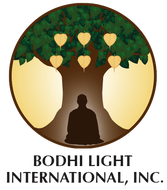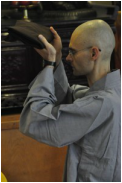After I got my plate of food, I sat down in the lunch hall to eat. I purposely put on the iPod earphones that one of my students offered me so I would be left alone. Half way through my meal, a young Caucasian male sat opposite the table from me and started talking to me. That was Thomas.
He was very polite and respectful. He told me that he was on his way to his Zen teacher’s temple in the mountains. Thomas was working on his PhD in Philosophy at the University of California in Irvine and he had been practicing meditation for ten years. I immediately asked, “Then how come you are still at zero samadhi?” He asked, “What is samadhi?” I said: “Samadhi refers to your concentration level. How can you practice meditation and not know about samadhi?” Thomas then asked to come to my temple in Rosemead where I was explaining about the samadhi levels during my lecture of the Earth Store Sutra. He came religiously every weekend to practice reciting the Buddha’s name in the morning and then stayed for the Sutra lecture in the afternoon. It took a few months to explain the eight samadhis, during which time Thomas quickly reached Second Dhyana. He used to ask a lot of questions every time I spoke Dharma. His curiosity was really insatiable. His questions were very bright and reflected his sincere desire to learn about Mahayana. When I finished explaining the Eighth level of samadhi, I said that I would not explain about the Ninth level until I explain the Vajra Sutra or formally teach Chan meditation. At that point, Thomas seemed to have gotten what he wanted and vanished. Several months later he came back to ask me for help. He has struggled with bouts of manic depression all his life and once again he found himself in this extremely difficult predicament. In addition, he realized that he learned a lot about Mahayana from my lectures. He read the teachings of my Chinese teacher, Great Master Xuan Hua, so he was considering learning Mahayana from me. I immediately replied that I could not help, so he left. He did not return to the temple for about a year. Eventually he asked for permission to come and participate on our weekend Dharma Assemblies. Several months later, he progressed to higher levels of samadhi and asked to move in to the temple as a volunteer resident. I then explained to him why I had initially turned down his requests for help and for being his teacher. Like most Westerners who want to learn Buddhism, he had the wrong attitude. His message was, “Here I am, teach me!” You can learn Buddhism from books or from a meditation instructor. However, if you want to learn my Mahayana, I must choose to teach you. You have to be taught because it is a gift conferred from a teacher to his chosen student. Thomas can give more detail on his life-long struggle with manic depression. In a nutshell, he found that although medication and counseling helped, the proper environment was also very important. That was why he chose to live for months at a time at his Japanese Zen teacher’s temple. Similarly, Thomas found peace and protection at our small temple. He practiced vigorously and worked tirelessly. Because of our intensive program, Thomas found that he had less time to sleep and rest. In the past, that would have caused more frequent bouts of manic depression. To his surprise, his mental health improved in spite of the increased workload and less time spent on sleep and rest. It’s probably due to a combination of a purer environment, a cleaner diet, protection from Medicine Master Buddha and our Chan and Pure Land Joint Practice. Five months after he came to our temple as a full time volunteer resident, Thomas completely stopped all manic depression medication. By the way, such medications are helpful but tend to have undesirable consequences as our Eastern temple medicine doctor pointed out to him. It has now been almost a year since he stopped taking medication and yet he seems to continue to progress well in his spiritual practice. I am very proud that Thomas decided to formally enter the monastic life as a novice monk under my guidance. Our monk training program is even more rigorous than that for volunteer lay people. Thomas will be faced with many tough challenges in the next two years. I hope that all of you will come forward and support him in his quest for spiritual fulfillment. |
|
RELATED LINKS© 2010 – 2023 Chanpureland.org
|
SubscribeJoin our mailing list today!
|


 RSS Feed
RSS Feed